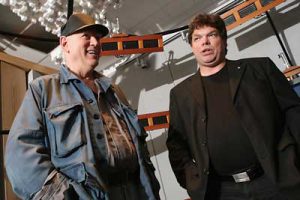
By Chris Chipello
If interdisciplinary learning represents the cutting edge of higher education, the Treble Cliff course is in the vanguard, drawing students and faculty members from Music, Management, Law, Communication Studies and Information Studies.
“I think it is a truly brilliant and remarkable course – certainly the best I’ve ever taken,” said Ryan Nelson, a Master’s student in Information Studies, who took the class last year. “It captures what I think to be the way that education at the big, formal institutions ought to go.”
Visiting professor Sandy Pearlman arrived at McGill five years ago with the idea for the course already in mind. Don McLean, then Dean at Schulich, and Associate Dean Bruce Minorgan signed on to help develop it, as did Desautels Faculty of Management Professor David Lank and Dean Peter Todd.
“The skills we think are at the core of good interdisciplinary practice include knowing what you don’t know, knowing where to find that out, learning how to talk to strangers (and disciplinary foreigners), and the ability to create frameworks and synthesize knowledge independently,” the class syllabus explains. Through short reflection essays and peer-reviewed projects and presentations, students in the course are expected to “develop new knowledge that is rigorous, theoretically grounded and accessible.”
While the course is pass/fail, students must complete a series of course components; and “in order to introduce students to diverse academic cultures, the course integrates methods of evaluation from each discipline.”
The final exercise involves pitching a business plan or policy project developed by groups of students from different disciplines.
The class brings together “interested, enthusiastic people from a variety of disciplines to talk about issues about which they’re very passionate,” Nelson said. “It’s the kind of course where big ideas come together, because all the components exist in the minds of all the participants.”
Despite the small class size, there were typically about five professors in the room any given session, Nelson noted. In addition to professors Pearlman, McLean, Minorgan and Lank, regular attendees included Prof. Tina Piper (who co-ordinated the class last year) and Associate Dean David Lametti from the Faculty of Law.
The pass/fail format encourages students to pursue their interests and not shrink from taking risks in their projects, Nelson said. “It allows you to experiment with wild ideas” rather than following the safest path to a high mark.
